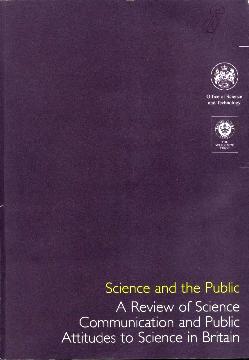
Now - cast your mind back to the dark days of the 1980s and the first great survey of public scientific ignorance. When the grandees of the Royal Society set up their Committee on the Public Understanding of Science (COPUS) in the mid-1980s, the multiplicity of mistaken assumptions that underpinned it was truly staggering. However, what was even more amazing, in a way, was the publication – in 1988 – of a paper (or at least something dressed up as such) in that most distinguished scientific journal, Nature.
This oeuvre, all eight pages of it (pretty long for Nature) – was written by John Durant, a leading science cheerleader at that time and later Professor in the Public Understanding of Science at Imperial College. The paper made shocking reading, but not (at least as far as I and other science journalists privately thought) for the reasons the author intended.
Without going into detail, Durant et al. concluded that the public was ignorant of science. This assertion was based on a frankly ludicrous pub-quiz questionnaire to which a number of “members of the public” had been subjected. This had asked questions best exemplified by the oft quoted, almost talismanic: “Can antibiotics kill viruses?” (I may be paraphrasing). The only allowable “correct” answer to this was “no”, but actually this is a question that many a biologist would struggle to answer. Sure, we have no antibiotics at present that work against viruses. But this does not mean that in principle antibiotics might not kill viruses.
In any case, does knowledge of a set of nerdy facts such as how many planets there are in the Solar System (another moot point) really test understanding of anything? Like anyone else, I know rather a lot about quite a lot of subjects on which, alas, my command of such detailed factoids as might win me a round of drinks at the Dog and Duck is decidedly shaky.
I understand quite a lot about the geology of the moon, and can explain the difference between the many theories of its formation, and even venture a suggestion as to why the leading theory is leading at the moment. I can explain how geologists think that once, the Moon was much closer to the Earth, why they think it, and what it meant for life on our planet. But could I really be confident about the current distance in kilometres of the Moon from the Earth, with quizmaster Durant peering at me and saying “Have to hurry you…”? And would it matter?
No. Would it betoken any higher understanding? No. So need we wring our hands over anyone not knowing such things? No. But despite the obtuseness of this “survey”, Nature published it almost in a spirit of public duty. It created huge publicity. Questions were asked, perhaps even in the House. Newspapers told the public straight – they were ignorant. The “deficit model”, and the assumption that “science” consisted of the contents of, to pick a random example, Professor Lewis Wolpert’s brain, was born. The public clearly had to be made to know what scientists know.
But the truth is, people don’t need to know what scientists know, and when they do – on discovering they have a particular illness, or of they are being pestered to support a dredging ban offshore their local beaches, half an hour on the Web can do the trick. But as far as “forming fully rounded functioning citizens” goes, citizens would do a lot better to learn whole bunch of other stuff that, in terms of social empowerment, is a good deal more important. I am thinking, for example about how the judicial and political systems of one’s country work, or, arguably, how the Saxon defeat at Hastings irrevocably changed British history, constitution and language. Or, for that matter, to appreciate that any sword and sorcery film featuring Arnold Schwarzenegger is likely to be complete fiction.
Scientists are (we know) relatively well loved and trusted by UK society, despite what they may feel (or occasionally read) to the contrary. Yes, people are generally “ignorant” about science by the standards of most scientists. But they are no more ignorant of science than anything else, and ignorance does not affect sympathy. When did learning the Krebs Cycle endear any non-biochemist to that noble profession? Education is education and public relations are public relations. If people are ignorant, improve their schooling. If people lack warm feelings, improve your public relations. But don’t expect everyone to want (or need) to know what scientists know. It isn’t going to happen.
Further reading
- 1066 and all that: how Hollywood is giving Britain a false sense of history The Independent 5 April 2004, p3.
- “Can you tell the difference between Quarks and DNA?” IoP Media Release 5 April 2004.
- Science and the public: a review of science communication and public attitudes to science in Britain. A joint report by the Office of Science & Technology (OST) and the Wellcome Trust. ISBN 1 841290 25 4. Available free as PDF at www.wellcome.ac.uk or from the Marketing Dept., Wellcome Trust, 183 Euston Road LONDON NW1 2BE. Tel: 020 7611 8651, FAX 020 7611 8545